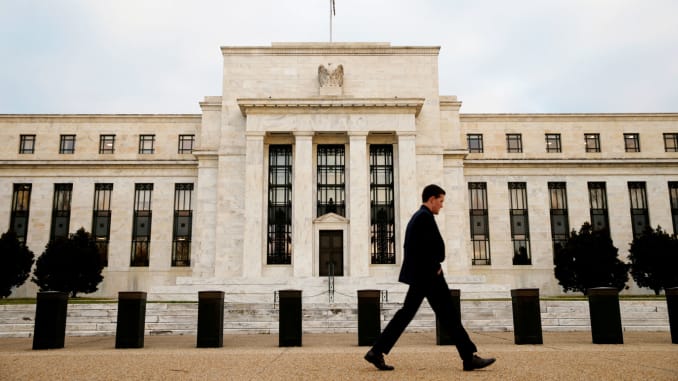
(Reuters) – Corona Capital is a column updated throughout the day by Breakingviews columnists around the world with short, sharp pandemic-related insights.
Take any good news where you can get it. The Federal Reserve on Wednesday published slightly more optimistic economic forecasts, reflecting a sharper rebound from America’s Covid-19 doldrums than Chair Jay Powell and his colleagues expected three months ago. The U.S. central bank also made clear its near-zero policy interest rate isn’t going up any time soon. With the new tilt toward creating jobs as opposed to controlling inflation, it would take a surge in prices to trigger rate increases.
The Fed’s forecasters aren’t expecting to have anything to worry about as they put inflation targeting on the back burner. They see annual price increases barely topping the 2% level, never mind going higher, even in 2023. For now, this sanguine view will keep financial conditions supportive for people and businesses getting back on their feet – though Powell again said Congress probably needs to provide more stimulus, too. With an election fast approaching, that’s something to be less sanguine about.
TUI’s grim vacation plans have only got a little sunnier. Europe’s biggest package holiday company is planning to raise up to 1 billion euros from investors to help tide it over a pandemic-induced bookings slump, Handelsblatt reported on Wednesday. That will help Chief Executive Friedrich Joussen, who last month unveiled a quarterly pre-tax loss of 1.5 billion euros, ease the pressure on the company’s balance sheet.
Not by much though. Net debt of 5.9 billion euros at the end of June means the tour operator would still owe more than 4 times its projected EBITDA for 2021 after the cash call. And any capital raise, while hardly unexpected, will be highly dilutive for existing investors. The tourism industry’s uncertain prospects have knocked 70% off TUI’s shares so far this year, shrinking the company’s market value to a little over 2 billion euros. Joussen could use an autumn break.
E-bike manufacturers are struggling to keep up with demand. At least there’s no shortage of venture capital. Dutch group VanMoof on Wednesday raised $40 million to boost production of its battery-assisted two-wheelers, which sell for around $2,000 each. The injection from Norwest Venture Partners, Felix Capital and Balderton Capital comes just four months after the company’s last fundraising.
Fear of Covid-19 has spurred urban commuters to seek alternatives to public transport, while big cities have built new cycle lanes. UK retailer Halfords last week reported a 230% jump in sales of electric bikes and scooters. VanMoof sold more bikes in the first four months of 2020 than in the previous two years. But rampant demand also means long wait times: VanMoof’s founders acknowledged they had “let too many of our riders down” and will invest in customer service. Venture funds can help deliver the jolt.
Consumer spending is the U.S. economy’s lifeblood, and sluggish retail sales in August warn that not all is well. The Commerce Department said Wednesday they rose 0.6% compared to July. Moreover, July’s figure was revised down.
One reason is that about 30 million Americans are on some form of unemployment assistance, and benefits are running out or have been reduced. A $600 per week supplement for those who lost their job because of the pandemic lapsed in July and was replaced by a smaller amount in some states. But decreasing confidence could be an issue too.
With retail spending slowing, economic expansion leans heavily on the recovery of hard-hit services such as healthcare, travel and education. The hope is declining Covid-19 case counts will increase people’s spending on these activities. That’s not likely if there’s less cash in people’s pockets. The National Football League may wish to overturn the ruling on its first week. Sure, legendary quarterback Tom Brady suited up as a Tampa Bay Buccaneer for the first time on Sunday, and the Fox broadcast scored the highest opening weekend numbers in four years. But it wasn’t all good news.






